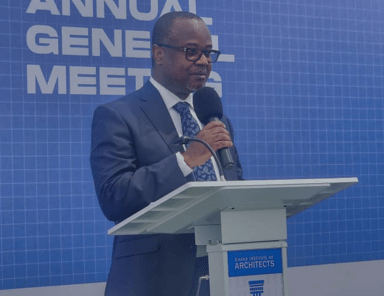Dr. Maxwell Opoku-Afari, First Deputy Governor of the Bank of Ghana, has underscored the critical role of a quality-built environment in fostering economic growth and national development.
Speaking at the Ghana Institute of Architects’ 2024 Annual General Meeting on November 28, he noted how well-planned infrastructure could drive property value appreciation, attract investments, and create jobs.
Addressing the theme Economic Significance of a Quality Built Environment, Dr. Opoku-Afari said that architecture is no longer limited to aesthetics but is pivotal to addressing challenges such as urbanization, energy efficiency, and sustainable development.
“A well-designed and well-maintained building can increase property values, attract businesses, residents, and investments. Quality buildings can command higher rental income, providing a stable source of revenue for property owners. Yet, in many developing countries, including Ghana, citizens spend their entire life savings on brick and mortar but cannot tap any economic benefits because the environment wipes away all the latent values in their properties,” he stated.
Dr. Opoku-Afari highlighted that the construction sector is a significant job creator, adding that routine maintenance of infrastructure stimulates local economic growth. However, he noted that many properties in Ghana do not achieve their full economic potential due to the lack of enabling systems.
“Building or buying property in Ghana has almost become like a sunk cost. Once the money goes into the property, there are very limited opportunities for owners to tap into the appreciating values of these properties to finance other aspects of their lifestyles. This is not purely the problem of architects and builders; it also requires creativity from those of us in the finance space,” he explained.
He further noted the untapped potential of property taxation, emphasizing its importance in domestic revenue mobilization.
“A well-designed built environment with proper cadastres would allow government to formalize property values and collect the required property taxes. This alone could help maintain the various amenities, enhance the value of our properties, and significantly improve tax revenue,” he said.
Dr. Opoku-Afari linked this to Ghana’s low tax-to-GDP ratio, which is around 13%, far below the 30% seen in advanced economies. He argued that leveraging property taxes could reduce Ghana’s reliance on borrowing and ease the fiscal burden.
Reflecting Culture and Progress
Dr. Opoku-Afari emphasized that a nation’s architecture should reflect its cultural identity and stage of development. Using the Bank of Ghana’s new head office, the Bank Square, as an example, he highlighted the economic and symbolic value of modern design.
“The edifice we see today reflects collaborative work between the main designer and the management of the Bank. It symbolizes Ghana’s growing influence as an economic powerhouse on the world stage and the direction of thinking of policymakers. Already, central banks in three African countries have requested tours of the facility, which demonstrates the influence and learning opportunities it creates,” he noted.
He urged architects to design bold, iconic structures that narrate Ghana’s aspirations and inspire national pride. “Buildings speak, and they speak for us. Let us design them to speak what we stand for, what we believe in, and our aspirations and ambitions,” he said.
Sustainability and Social Benefits
Dr. Opoku-Afari also stressed the environmental advantages of sustainable architecture, pointing to the importance of energy-efficient and water-saving designs.
“Energy-efficient buildings can reduce energy consumption, lower greenhouse gas emissions, and cut costs. Incorporating water-saving features reduces water consumption and wastewater generation,” he stated.
On social benefits, he added that well-designed public spaces foster social cohesion, promote community interaction, and reduce crime.










